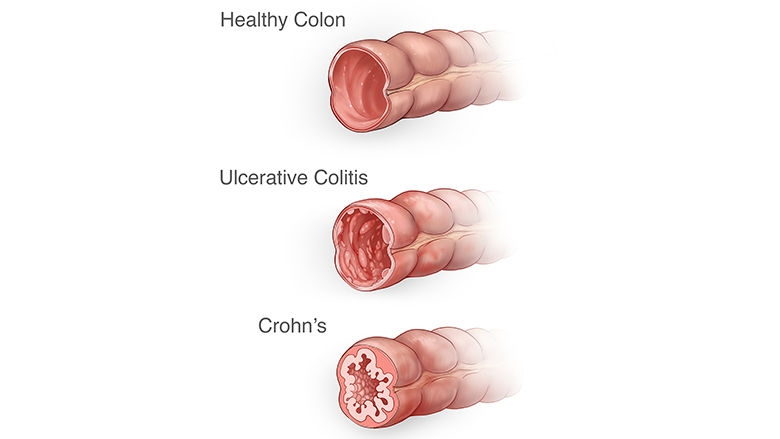Inflammatory Bowel Disease
What is inflammatory bowel disease?
Inflammatory bowel disease (IBD), which includes Crohn's disease and ulcerative colitis, is an inflammatory disease affecting approximately 1.6 million Americans, including as many as 80,000 children. Most cases are diagnosed prior to the age of 35, making IBD one of the most significant chronic diseases affecting children and adolescents.
 The immune system works as a network of cells and tissues to defend the body from infection. In inflammatory diseases, like IBD, problems with the immune system cause the body’s antibodies and immune cells to mistake its own healthy cells as invaders. Imagine an intruder, like a cold virus, invading your body. Your immune system identifies, kills, and eliminates it from your body, protecting you from illness. In an inflammatory disease the immune system sometimes responds inappropriately and the body’s healthy cells are targeted, thus signaling the body to attack them. This results in inflammation that can significantly affect a child’s quality of life.
The immune system works as a network of cells and tissues to defend the body from infection. In inflammatory diseases, like IBD, problems with the immune system cause the body’s antibodies and immune cells to mistake its own healthy cells as invaders. Imagine an intruder, like a cold virus, invading your body. Your immune system identifies, kills, and eliminates it from your body, protecting you from illness. In an inflammatory disease the immune system sometimes responds inappropriately and the body’s healthy cells are targeted, thus signaling the body to attack them. This results in inflammation that can significantly affect a child’s quality of life.
IBD is sometimes confused with irritable bowel syndrome (IBS), as the names are similar, and the symptoms can be as well. However, the two conditions require different approaches to treatment. Learn more about the differences.
Types of IBD in children
Inflammation of the gastrointestinal (GI) tract occurs in both Crohn’s disease and ulcerative colitis, yet there are important difference between the two diseases.
Crohn's disease
Crohn's disease is characterized by a chronic inflammatory process that may affect any part of the GI tract, from the mouth to the anus, extending through one or more layers of the intestinal wall. It may appear in “patches,” affecting one area of the GI tract and not the next.
Ulcerative colitis
Ulcerative colitis is characterized by continuous segments of inflammation in the large intestine (colon) and the rectum. Only the innermost layer of the intestinal wall is affected.
In both Crohn’s disease and ulcerative colitis, children have periods of no symptoms (remission) alternating with periods of inflammatory symptoms (flare).
What are the signs of ibd in children?
While the clinical signs of IBD can vary from child to child, some symptoms may be more common than others. Symptoms related to inflammation in the GI tract may include:
- abdominal pain
- diarrhea
- blood in the stool
- urgent need to move bowels
- weight loss
Some children may experience other symptoms, including skin rashes, joint pain, fatigue, or fevers.
Causes of IBD in children
While the exact cause of IBD is not entirely understood, research suggests that the inflammation in IBD involves an interaction between genes, environmental factors, and the immune system. Foreign substances (antigens) in the environment may directly cause inflammation, or they may “trigger” the body's defenses to produce inflammation that does not subside.
Once the immune system in a child with IBD is “switched on”, it may not know how to properly "switch off." As a result, the inflammation damages the tissues causing the symptoms of IBD. This is why a main focus of medical therapy is to help children regulate their immune system.
What is life like for a kid with IBD?
These chronic diseases can be treated, but not yet cured. As a team, we work with families to determine the best course of treatment for the child to promote the highest quality of life.
Emotional concerns and support
Being a child or teen is not always easy – and it can sometimes be harder when IBD is added to the mix of school, activities, friends and family life. Every child and family copes with IBD differently. Learn more about psychosocial support for children with IBD.
How is IBD in children and adolescents diagnosed?
Our team of gastroenterologists perform a thorough health history and physical examination and use a variety of tests to determine a diagnosis. Testing may include:
- blood work
- stool samples
- imaging studies
- endoscopy and colonoscopy with biopsies (a small piece of tissue sent to the lab to evaluate for inflammation)
These tests help to identify laboratory abnormalities, including anemia or low blood protein levels, identify areas of the digestive tract with active inflammation, and determine if there is a contributing infection. Imaging studies, such as magnetic resonance enterography (MRE), ultrasound and video capsule endoscopy provide a detailed picture of the small intestine. These, along with an endoscopy and colonoscopy, offer a head to toe look at the inside of the body. Our child life specialists provide age-specific educational resources to assist in coping and psychosocial support with procedures.
The diagnosis may be difficult to confirm at first, which is why we use a variety of tests. In some cases, it may also be difficult to distinguish Crohn’s disease from ulcerative colitis, the other common type of inflammatory bowel disease. This is known as indeterminate colitis.
Treatment for IBD in children and adolescents
IBD in children and teenagers
The therapy for IBD is complex and may be different for every child. The main goals of medical treatment are to relieve symptoms, prevent flares, and achieve mucosal healing (healing of the intestine) and remission. Together, the ultimate aim is for a child to lead a normal life as possible and still be able to reach their personal goals. In order to help guide the treatment process, we are able to perform many different tests, imaging, and procedures which paint a picture of what is going on inside the body.
Treatment with medication is one therapeutic option. There is no “one size fits all” treatment for IBD. Children respond to different medications or sometimes, a combination of medications. Children requiring intravenous infusion therapies will be seen in our state of the art infusion center.
Nutritional therapy, often when used with medical treatment, is another important therapy that can include a variety of options. In order for the body to heal, a child must have good nutrition. We have IBD dieticians who work with families in nutritional support. Learn more about the IBD Center's Nutrition Services.
In instances when medication may not adequately control symptoms for children with IBD, or when disease complications arise, surgery may be a therapeutic option. Our surgeons who specialize in IBD are available to meet with families to guide the surgical process when necessary. Learn more about J-pouch Surgery and Bowel Resection Surgery.
Reviewed by Andrew B. Grossman, MD, Judith R. Kelsen, MD















